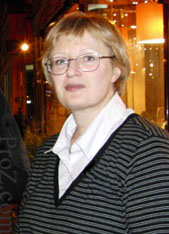Russian fuzzy match rate? Thread poster: Elias Lemoine
|
|---|
Hello!
I've been told that Russian language cannot make use of fuzzy matches like other languages. Basically, the structure of the language is so complex that it takes a lot of time to edit fuzzy matches. That's why Russians don't have a level for fuzzy matches in their rate composition.
Is this correct?
Any help will be appreciated!
| | | | Natalie 
Poland
Local time: 03:02
Member (2002)
English to Russian
+ ...
MODERATOR SITE LOCALIZER
But who exactly told you this? Perhaps it was a person who does not know Russian him/herself? Russian fuzzies need as much editing as those in German, or French, or Polish. In fact, fuzzies in all languages need various extents of editing.
| | | | SirReaL 
Germany
Local time: 03:02
English to Russian
+ ...
| Not exactly as you describe | Jan 24, 2009 |
It does take a lot of time to edit fuzzy matches in Russian, but that doesn't stop me (and others in my pair) from giving fuzzy-match discounts. The discounts themselves may be different from other language pairs, I'm not sure what they are really.
But of course Natalie is right about other languages - every language requires fuzzy-match editing to some degree.
| | | | | Several issues | Jan 24, 2009 |
Elias Lemoine wrote:
Hello!
I've been told that Russian language cannot make use of fuzzy matches like other languages. Basically, the structure of the language is so complex that it takes a lot of time to edit fuzzy matches. That's why Russians don't have a level for fuzzy matches in their rate composition.
Is this correct?
Any help will be appreciated!
First, you don't indicate which CAT tool is being used. Different tools use different algorithms and a given passage, checked against a translation memory, may come up with different degrees of "fuzziness". It may be easier to edit fuzzy matches in some tools than others. But they can all be edited.
Fuzzy matches do need to be edited (and even 100% matches need to be checked), both in Russian and in any other language. They're fuzzy matches, meaning by definition that they're not 100% identical. Are you surprised that the translations aren't identical either?
Individual translators and their clients set the amounts of fuzzy match discounts. If translator A wants to give a 5% discount for fuzzy matches over 80% and agency B insists on a 50% discount, the two of them have to come to some sort of agreement. (This agreement may be the translator telling the agency to fly a kite and the agency going to the store to get one.) But there is no universal standard for fuzzy discounts.
| | |
|
|
|
James McVay 
United States
Local time: 21:02
Russian to English
+ ...
| A slightly different complication | Jan 24, 2009 |
I don't have a problem with fuzzy matches with the TM, but glossary look-up in Russian causes problems. Russian nouns has six cases, and I have yet to find a CAT program that will find a term in a Russian glossary unless the match is exact. The situation with verbs is even worse. Luckily, there are a number of very good electronic and on-line Russian-English dictionaries.
[Edited at 2009-01-24 22:56 GMT]
| | | | | A little bit more | Jan 26, 2009 |
Hello all,
Thank you for your replies!
The tool in question is Trados, set to a 50% as a minimum for fuzzy matches results.
Natalie (Moderator), it was a Russian translator who told me this. I work as a PM for a translation company, and I was required to investigate a little bit more about the complexity of Russian. It's the first time I encounter this issue in my career. However, it may be possible and logical, you know how different languages are one a... See more Hello all,
Thank you for your replies!
The tool in question is Trados, set to a 50% as a minimum for fuzzy matches results.
Natalie (Moderator), it was a Russian translator who told me this. I work as a PM for a translation company, and I was required to investigate a little bit more about the complexity of Russian. It's the first time I encounter this issue in my career. However, it may be possible and logical, you know how different languages are one another.
I definitely agree with all of you that fuzzy matches in all languages must be edited. Some take longer than others, but they are editable.
What I'm trying to figure out is: compared to other languages, is it THAT hard to edit all fuzzy matches in Russian as it is in other languages? Hard enough so that fuzzy matches are counted as no matches?
Thanks! ▲ Collapse
| | | | | "Nuts and bolts" translation jobs | Feb 3, 2009 |
Hi from Russia.
In Russian, all those matches and fuzzy matches make sense ONLY in a kind of "nuts and bolts" translation jobs - like lists of spare parts, etc. You can NEVER rely on them in any other sort of texts like law, business, marketing, advertising, etc. etc.
In the majority of cases they cannot be applied - exactly for those Russian-inherent declention and conjugation reasons mentioned above.
I, personally, never agree to any fuzzy match discounts... See more Hi from Russia.
In Russian, all those matches and fuzzy matches make sense ONLY in a kind of "nuts and bolts" translation jobs - like lists of spare parts, etc. You can NEVER rely on them in any other sort of texts like law, business, marketing, advertising, etc. etc.
In the majority of cases they cannot be applied - exactly for those Russian-inherent declention and conjugation reasons mentioned above.
I, personally, never agree to any fuzzy match discounts. ▲ Collapse
| | | | esperantisto 
Local time: 05:02
Member (2006)
English to Russian
+ ...
SITE LOCALIZER | Which other languages? | Feb 3, 2009 |
I've been told that Russian language cannot make use of fuzzy matches like other languages.
This is not about the language structure, but rather about the script. The Chinese/Japanese script does not use spaces between the words, thus making it very hard to parse sentences.
Cyrillic script is not harder to parse as compared to Latin. And if you have a suitable tokenizer, it can help you greatly.
On the other hand, it is not the language structure that plays the key role. It is the fact that Russian words often have much more precise, narrower meanings as compared to English (if we take particularly Russian-to-English translation or vice versa). Just one example: the word name is translated as название, if it refers to an object, or as имя, if it refers to a person. Thus, translating from English to Russian you get a 100%, strict match in the both cases, but you must carefully review it not to write nonsense in the Russian text! And translating from Russian to English, you will get no match, but with a good glossary you will easily cope with it.
| | |
|
|
|
| Fuzzy matches | Feb 3, 2009 |
Elias Lemoine wrote:
What I'm trying to figure out is: compared to other languages, is it THAT hard to edit all fuzzy matches in Russian as it is in other languages? Hard enough so that fuzzy matches are counted as no matches?
One of good reasons is in Pavel's post:
Pavel Kozlov wrote:
In the majority of cases they cannot be applied - exactly for those Russian-inherent declention and conjugation reasons mentioned above.
In practice this could sometimes mean changing ending/form of almost every word on a sentence. And sometimes it's easier and faster to type whole translation again, than jump to every word and edit it. In cases like this a translator has not much help from TMs, except of tips which terms to use.
Pavel Kozlov wrote:
I, personally, never agree to any fuzzy match discounts.
Neither do I (Polish is in this matter very similar to Russian, and I imagine to most of Slavic languages).
Anni
| | | |
Hi there,
Thank you for your replies. I have a much clearer image now! and I agree with you.
I think I don't have further questions as of now. Thank you very much to the people who participated!
Elias
| | | | To report site rules violations or get help, contact a site moderator: You can also contact site staff by submitting a support request » Russian fuzzy match rate? | TM-Town | Manage your TMs and Terms ... and boost your translation business
Are you ready for something fresh in the industry? TM-Town is a unique new site for you -- the freelance translator -- to store, manage and share translation memories (TMs) and glossaries...and potentially meet new clients on the basis of your prior work.
More info » |
| | CafeTran Espresso | You've never met a CAT tool this clever!
Translate faster & easier, using a sophisticated CAT tool built by a translator / developer.
Accept jobs from clients who use Trados, MemoQ, Wordfast & major CAT tools.
Download and start using CafeTran Espresso -- for free
Buy now! » |
|
| | | | X Sign in to your ProZ.com account... | | | | | |









